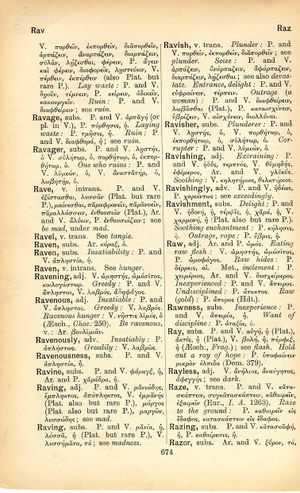rave: Difference between revisions
From LSJ
Ὁ συκοφάντης ἐστὶν ἐν πόλει λύκος (τοῖς πέλας λύκος) → Calumniator, quemquem novit, huic lupus'st → Der Denunziant lebt in der Stadt gleichsam als Wolf (ist seinen Nachbarn wie ein Wolf)
(CSV4) |
(D_7) |
||
| Line 2: | Line 2: | ||
|Text=[[File:woodhouse_674.jpg|thumb|link={{filepath:woodhouse_674.jpg}}]]'''v. intrans.''' | |Text=[[File:woodhouse_674.jpg|thumb|link={{filepath:woodhouse_674.jpg}}]]'''v. intrans.''' | ||
P. and V. ἐξίστασθαι, λυσσᾶν (Plat. but rare P.), μαίνεσθαι, παραφρονεῖν, παρανοεῖν, παραλλάσσειν, ἐνθουσιᾶν (Plat.), Ar. and V. ἀλύειν, P. ἐνθουσιάζειν; see <b class="b2">be mad</b>, under [[mad]]. | P. and V. ἐξίστασθαι, λυσσᾶν (Plat. but rare P.), μαίνεσθαι, παραφρονεῖν, παρανοεῖν, παραλλάσσειν, ἐνθουσιᾶν (Plat.), Ar. and V. ἀλύειν, P. ἐνθουσιάζειν; see <b class="b2">be mad</b>, under [[mad]]. | ||
}} | |||
{{Gaffiot | |||
|gf=<b>rāvē</b>, adv., d’une manière enrouée : Gloss. Scal. | |||
}} | }} | ||
Revision as of 07:02, 14 August 2017
English > Greek (Woodhouse)
v. intrans.
P. and V. ἐξίστασθαι, λυσσᾶν (Plat. but rare P.), μαίνεσθαι, παραφρονεῖν, παρανοεῖν, παραλλάσσειν, ἐνθουσιᾶν (Plat.), Ar. and V. ἀλύειν, P. ἐνθουσιάζειν; see be mad, under mad.
Latin > French (Gaffiot 2016)
rāvē, adv., d’une manière enrouée : Gloss. Scal.

